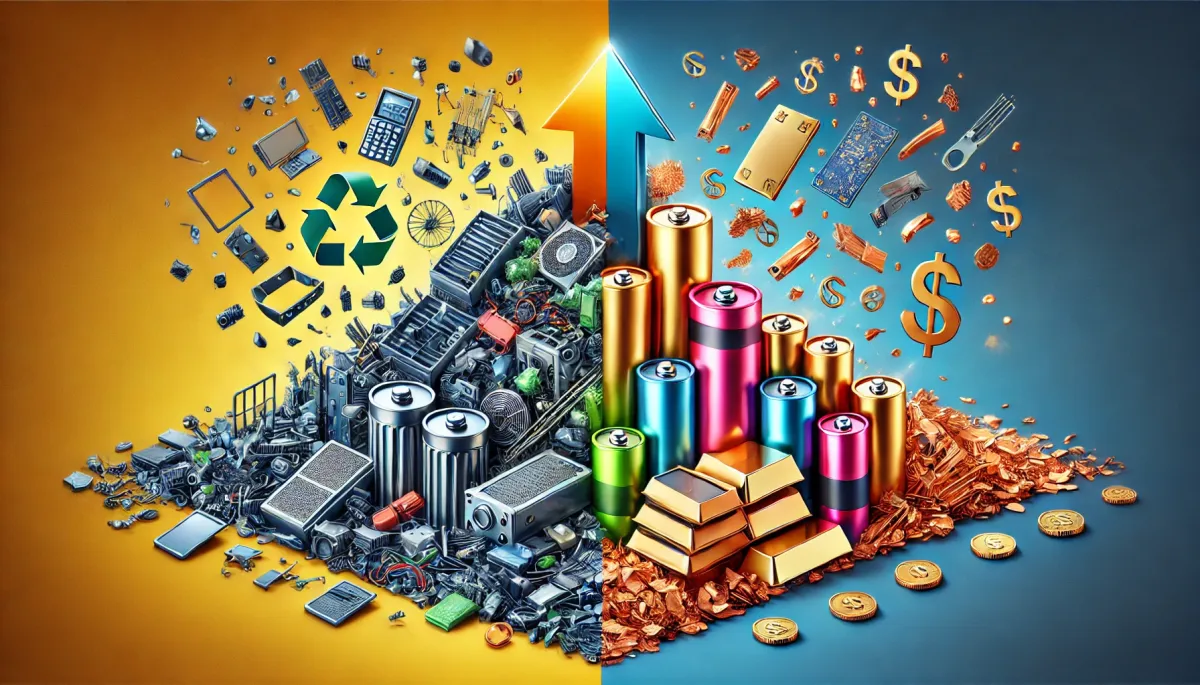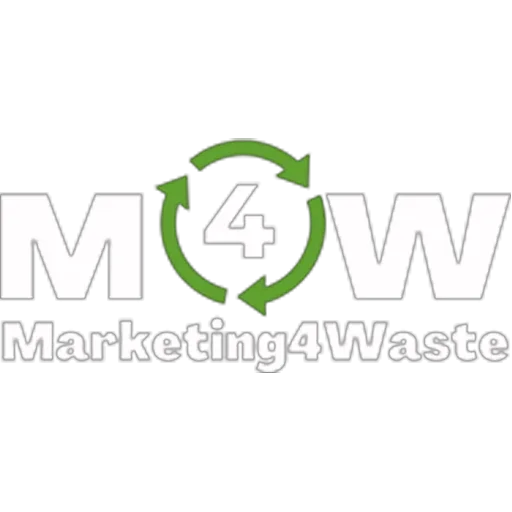Increase the Revenues of Your Waste Company With the Tips Shared in Our Blog Articles

How to Profit Big by Turning Local Trash into Local Treasure: The New Gold Rush in Secondary Raw Materials
It’s no secret we’re living in turbulent economic times. Tariffs are flying, trade wars are heating up, and global supply chains are wobbling like an overloaded truck on an icy road. Industries from manufacturing and technology to energy are feeling the pinch, staring down the barrel of rising raw material costs. If you’re in business, there’s a storm brewing, and the next five years are going to sort out the winners from the losers.
So, here's the million-dollar question: How do you thrive amidst the chaos? The answer is staring at you from your dumpster. That’s right—your trash is the new cash, and it's time you start treating it as such.
[Download my eBook Thriving With Waste]
The Untapped Treasure in Your Local Waste
Businesses and municipalities nationwide are throwing away fortunes every single day without even realizing it. Metals, plastics, and other critical raw materials are hidden within our waste streams, waiting to be recovered and re-enter the local economy. I call this process "Waste Management Alchemy," the profitable transformation of trash into treasure.
With soaring tariffs pushing imported commodities through the roof, locally sourced secondary raw materials extracted from waste represent an unprecedented goldmine. Consider three powerhouse sectors that desperately need stable, predictable supplies of materials to keep their doors open and their profits flowing: Energy, Technology, and Manufacturing.
[Download my eBook Thriving With Waste]
Energy Sector’s Secondary Materials Boom
Right now, the energy market is thirsty. It's hungry for resources like copper, lithium, and cobalt—critical elements for electrification, energy storage systems, and infrastructure. The demand is staggering, but tariffs have made importing these materials financially draining and increasingly complicated.
Where do these resources exist abundantly? In our discarded electronics and used batteries.
Take lithium-ion batteries, for instance. America discards millions of electronic devices annually, each one packed with valuable lithium, cobalt, and nickel. Reclaiming these metals locally through specialized recycling processes puts you squarely in the heart of an explosive growth market. In fact, experts predict the market for recycled lithium alone will triple over the next five years.
The savvy entrepreneur sees not just environmental virtue here—but real, quantifiable profits. Imagine tapping into a local pipeline of battery waste and electronics recycling. By focusing on this material recovery, you sidestep global tariffs entirely and transform a liability into a lucrative asset, feeding directly into the rapidly expanding energy sector.
[Download my eBook Thriving With Waste]
Technology Sector: Your Next Big Opportunity
Tech companies across America are currently scrambling. High import duties are pushing the costs of essential tech materials sky-high, threatening both innovation and profitability. Copper, precious metals, rare earths—all critical to chip manufacturing, electronic circuits, and advanced components—are suddenly prohibitively expensive.
Yet, we sit atop mountains of electronic waste. Consider this fact: a ton of smartphones yields more gold than a ton of gold ore. Yes, your discarded smartphone has a higher concentration of gold than what you’d find in many gold mines. Extracting metals from e-waste is no longer a nice-to-have; it’s your competitive edge.
If you're still skeptical, here's your wake-up call: the electronic waste recycling market is projected to balloon past $70 billion over the next decade. Local businesses specializing in e-waste recovery will cash in big, supplying valuable secondary materials to hungry tech manufacturers at competitive prices, entirely insulated from tariff-induced volatility.
[Download my eBook Thriving With Waste]
Manufacturing Industry’s Hidden Profits in Scrap Metals
Steel and aluminum tariffs have thrown the manufacturing industry into disarray. Companies are desperately searching for affordable, predictable sources of metals. Yet many overlook their biggest local resource: scrap metal.
Every year, millions of tons of steel and aluminum waste accumulate from local construction projects, automotive industries, and everyday commercial operations. Smart entrepreneurs understand this isn’t just junk—it's wealth disguised as rust. Secondary steel and aluminum from scrap are considerably cheaper than freshly produced metals, making them irresistible to cost-conscious manufacturers desperate to cut expenses.
Here’s a powerful secret: many manufacturers are actively looking for local suppliers of secondary raw materials to reduce their exposure to tariff-driven price swings. Positioning yourself as the go-to local source for quality scrap metal not only insulates your customers from global volatility—it cements your place as an indispensable player in their supply chain.
[Download my eBook Thriving With Waste]
Why Local? Why Now?
Relying on foreign suppliers used to be a cost-saving strategy. Now it’s a liability. Tariffs and unpredictable trade relationships have completely reshuffled the deck. Businesses need dependable local sources of raw materials to maintain predictable costs, reliable supply chains, and ultimately—profitability.
Here's a secret that successful business operators have always known: Control the raw material supply, and you control your profitability.
Local extraction and provision of secondary raw materials positions you as a critical supplier insulated from international drama. Your customer relationships grow deeper, your contracts get longer, and your revenue streams become more stable. In short, you become indispensable.
[Download my eBook Thriving With Waste]
Your Roadmap to Waste Management Alchemy
If you're wondering how to seize this unprecedented opportunity, here’s a simple three-step blueprint:
Step 1: Identify High-Value Waste Streams Conduct local waste audits. Pinpoint where your community or local businesses generate the most valuable waste streams. Metals in e-waste, plastics from industrial production, scrap metals from manufacturing—each represents unique local opportunities.
Step 2: Invest in Specialized Processing Secondary materials extraction requires specialized knowledge and equipment. This isn't a casual endeavor—this is a strategic investment that can yield massive returns. Whether it's shredding technology for e-waste, metal extraction processes, or polymer processing equipment, these capabilities place you head and shoulders above the competition.
Step 3: Forge Strategic Local Partnerships Align yourself directly with local manufacturers, tech companies, and energy producers. These businesses need reliable partners to ensure consistent supply and predictable pricing. Become their solution provider, and you’ll create long-term lucrative relationships.
[Download my eBook Thriving With Waste]
Real Businesses, Real Profits
Let’s make this concrete with a quick example. Redwood Materials, founded by a former Tesla executive, is already making waves by extracting lithium, cobalt, and nickel from electronic waste. They sell directly back to battery producers. Today, Redwood is valued in the billions. They saw what others missed: profit hidden in trash.
There are hundreds of other opportunities just like this, waiting for you to grab hold. The best part? You don’t need to be a corporate giant to win big here. Small, agile operations positioned correctly can seize market share from slower-moving, tariff-dependent competition. With strategic investments and local partnerships, you’re perfectly positioned to profit—massively.
[Download my eBook Thriving With Waste]
Are You Ready to Take Action?
Every economic shakeup creates losers and winners. The winners aren’t smarter or luckier—they’re quicker to see opportunity where others see chaos. Right now, the smart money is on secondary raw materials. It’s not about ideology, and it’s certainly not about charity. It’s about bottom-line profits, predictable supply chains, and economic resilience.
You have a rare moment—a historic economic realignment that could permanently alter the competitive landscape. Will you seize this opportunity? Or will you let someone else profit from the riches hidden right beneath your feet?
Your local trash has never been more valuable.
Don't waste this moment.
To Your Success,
Sam Barrili
The Waste Management Alchemist


© 2025 Marketing4waste - All Rights Reserved,
Marketing4Waste is a brand of MiM MarketingInterimManagers LLC
+1 801 804 5730

